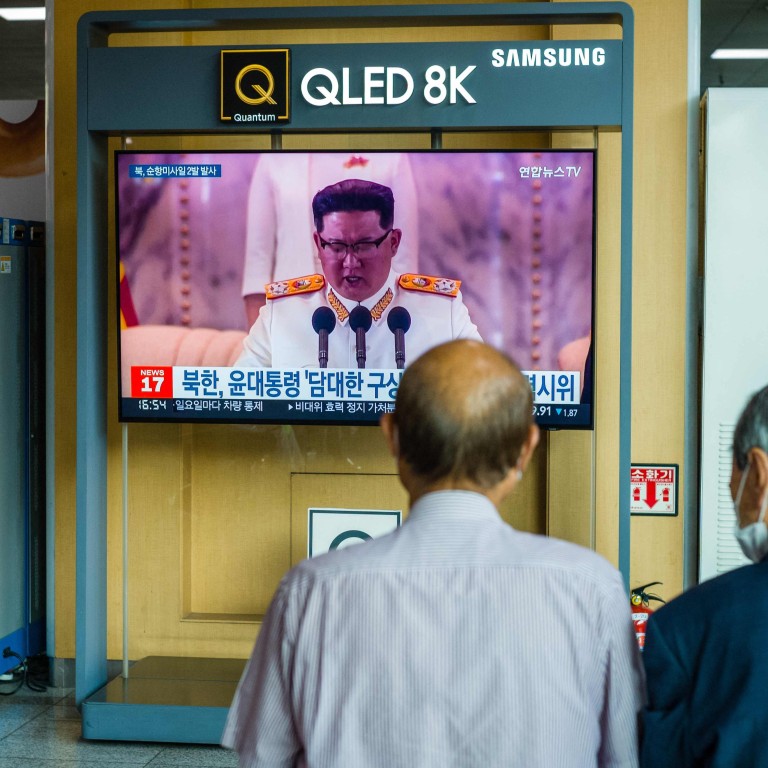
Next North Korea nuclear test could lead US to deploy ‘strategic assets’ to South Korea, two allies say
- Joint statement from Washington and Seoul also describing expanded military drills points to closer bilateral ties as US-China relations languish
- Concerns over North Korea’s growing nuclear arsenal run high after latest launch of cruise missiles off its west coast just hours earlier
The statement rounded off two days of bilateral meetings between high-level defence officials in Seoul, known as the Korea-US Integrated Defence Dialogue. It was the 21st such meeting between the two sides.
Both governments have warned in recent months that Pyongyang could be preparing to test a nuclear weapon for what would be the country’s seventh time.
“The two sides affirmed that, should the DPRK conduct a nuclear test, the ROK and the US will engage in a strong and firm bilateral response, to include options to deploy US strategic assets to the region,” the statement said, using an acronym for the Democratic People’s Republic of Korea, North Korea’s official name.
While definitions for “strategic assets” may vary and it remains unclear which of them Washington might deploy, the phrase often refers to military equipment involved in launching nuclear weapons, such as aircraft carriers or bombers, which Seoul does not possess.
The two countries are planning to conduct large-scale joint military exercises beginning next week “to bolster combined readiness”, the statement said.
Earlier this week the Pentagon said the US, South Korea and Japan had just completed joint naval drills near Hawaii – described as a “missile warning and ballistic missile search and tracking exercise” – to respond to “DPRK challenges”.
In the statement on Wednesday, the allies also “applauded” improvements to an American missile defence system first installed in South Korea in 2017 to protect the country from North Korean missiles.
The Yoon administration says the missile defence system is a non-negotiable matter of self-defence, while Beijing worries the US could use it to monitor Chinese weapons.
Beijing has continued to push Seoul on the issue, including last week when Chinese Foreign Minister Wang Yi met with South Korean Foreign Minister Park Jin.
After the meeting, China’s foreign ministry claimed South Korea had agreed to limit the scope of the missile defence system, but Seoul disputed that account.
Beijing urges Seoul not to let missile shield become ‘stumbling block’ in ties
“Our government clearly states that THAAD is a self-defensive defence tool aimed at protecting our people’s lives and safety from North Korea’s nuclear and missile threats and a matter of security sovereignty that can never be subject to negotiation,” a presidential official said last week, according to South Korea’s Yonhap News Agency.
In the joint statement issued on Wednesday, the US and South Korea said they “acknowledged the importance of the alliance’s missile defence architecture in defending the ROK people – as well as US and ROK deployed forces – particularly considering recent DPRK missile tests”.
China is South Korea’s largest trade partner by far, but Yoon vowed during his presidential campaign to stand up more firmly to any pressure from Beijing.
South Korea’s unprecedented trade deficit with China not ‘systematic change’
Soo Kim, a former intelligence analyst at the CIA and now a policy analyst at the Rand Corporation in Washington, said the joint statement showed the US-South Korean alliance was evolving and expanding in the face of threats, but that Seoul still might not be willing to go as far as the US wants to challenge the Chinese government.
“Seoul appears to have an understanding that the alliance needs to expand and mature to be able to address challenges beyond the Korean peninsula,” she said. “And the Yoon administration seems to generally agree.”
But Yoon’s hesitation to meet Pelosi in person when she visited South Korea “revealed Seoul’s lingering sensitivities to Beijing’s backlash”, the analyst added, noting such concerns would likely figure into “Seoul’s calculations on matters that have implications on both Washington and Beijing”.

